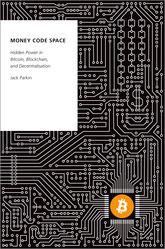
Newly emerging cryptocurrencies and blockchain technology present a challenging research problem in the field of digital politics and economics. Bitcoin—the first widely implemented cryptocurrency and blockchain architecture—seemingly separates itself from the existing territorial boundedness of nation-state money via a process of algorithmic decentralisation. Proponents declare that the utilisation of cryptography to advance financial transactions will disrupt the modern centralised structures by which capitalist economies are currently organised: corporations, governments, commercial banks, and central banks. Allegedly, software can create a more stable and democratic global economy; a world free from hierarchy and control. In Money Code Space, Jack Parkin debunks these utopian claims by approaching distributed ledger technologies as a spatial and social problem where power forms unevenly across their networks. First-hand accounts of online communities, open-source software governance, infrastructural hardware operations, and Silicon Valley start-up culture are used to ground understandings of cryptocurrencies in the “real world.” Consequently, Parkin demonstrates how Bitcoin and other blockchains are produced across a multitude of tessellated spaces from which certain stakeholders exercise considerable amounts of power over their networks. While money, code, and space are certainly transformed by distributed ledgers, algorithmic decentralisation is rendered inherently paradoxical because it is predicated upon centralised actors, practices, and forces.